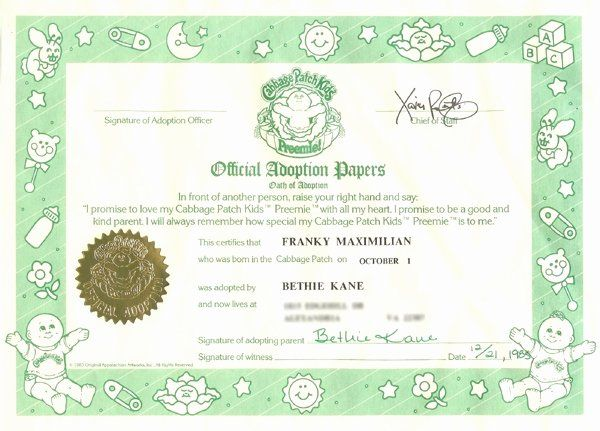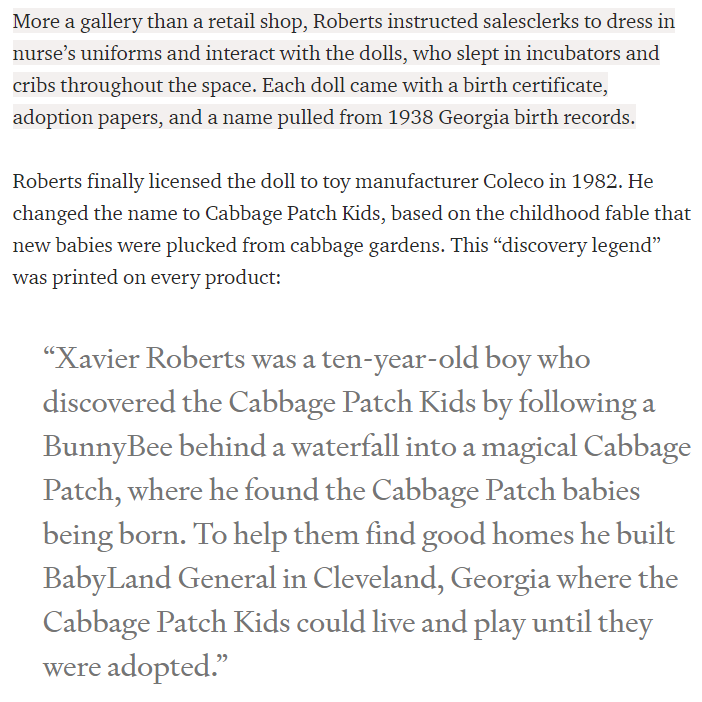
NFTs are the latest reprise of the Internet's original democratizing promise -- and the gold rush that follows when there's money in the air. In this case, out of thin air. theatlantic.com/ideas/archive/…
So, @Williamjmarks5 and I sat down to work through the current NFT mania -- itself built on top of the cryptocurrency/blockchain mania -- and see whether there's a there there. (Below: is it soh-rawr-ey? oh: so-rare) 

Pinning down the value of NFTs gets philosophical pretty quickly. But a first observation is that people might buy something because they think others might want to buy it for more, later. Classic speculation, doable without ever asking what makes something innately valuable. 

If people buy things because they think others will pay even more for them later -- because those others believe the same thing about still later others -- you have the makings of a speculative bubble. See @StephMBuck's account of the Cabbage Patch craze: timeline.com/cabbage-patch-…
Of course, Cabbage Patch dolls have their own innate value in the sense that some kids *want* them. Kids can hold them, carry them around, etc.
NFTs aren't like that. They are ... digital tokens. On a blockchain, those tokens can be assigned to a unique wallet. Maybe yours!
NFTs aren't like that. They are ... digital tokens. On a blockchain, those tokens can be assigned to a unique wallet. Maybe yours!

The first pic here documents one kind of Ethereum token, ethereum.org/en/developers/…. The token goes on a blockchain, but the art(ifact) it ... represents? ... is typically stored elsewhere and merely linked (second pic, from @jonty's wonderful thread at 

https://twitter.com/jonty/status/1372163423446917122?s=20).


To be sure, intangible things often have value and are sold, even when no one can hold them or carry them around. A song can bring joy, and copyright creates forms of ownership under law where physics falls short. E.g., copyright holders can license the right to copy that song. 

But!: NFTs today typically don't convey rights like that. They could purport to do so, just as selling them could include sending a physical gift to the buyer. But then we're not talking about the NFTs' value, but rather the value of extras the buyer gets and others don't.
No, the value of a standard NFT is more like the value of Honus Wagner's signature on a baseball card. Now just imagine taking away the card and leaving the signature, and you've got it! 

Which brings us back to Cabbage Patch Kids. What made the dolls distinct -- valuable! -- before the speculative craze amplified prices further was a narrative about the dolls' origins, culminating in their "adoption" by real kids. (Second pic is from @StephMBuck's essay.) 



Its narratives like these that fuels romantic (as compared to speculative) buying of NFTs. A token originating from an artist or other famous person carries the meaning of an autograph without requiring anything physical, including ink. Which makes authenticating sources vital!
Add to that the times that people buy NFTs directly from artists simply to finance them and to publicly advertise that support, and some purchases really start to make sense. (Artists in turn have warmed to NFTs that pay royalties, ideally automatically, off downstream sales.)
NFTs hosted on a distributed blockchain like that of Bitcoin or Ethereum add to the sense of authenticity, precisely because no one "owns" those platforms. They are generic, public, collective hallucinations. Like the Internet. And the World Wide Web.
Which is how unowned platforms can be, fittingly, the vehicles for forms of ownership whose source of value is stripped down to the simple declaration of a relationship between a seller and a buyer who choose to be connected. theatlantic.com/ideas/archive/…
Deepest thanks to @leppert and @jstn for sharing some of the technicalities and practicalities of today's instantiations of NFTs, and to co-author @Williamjmarks5 and @theatlantic editor @danteramos. Errors, of course, are mine. More to follow!
• • •
Missing some Tweet in this thread? You can try to
force a refresh







